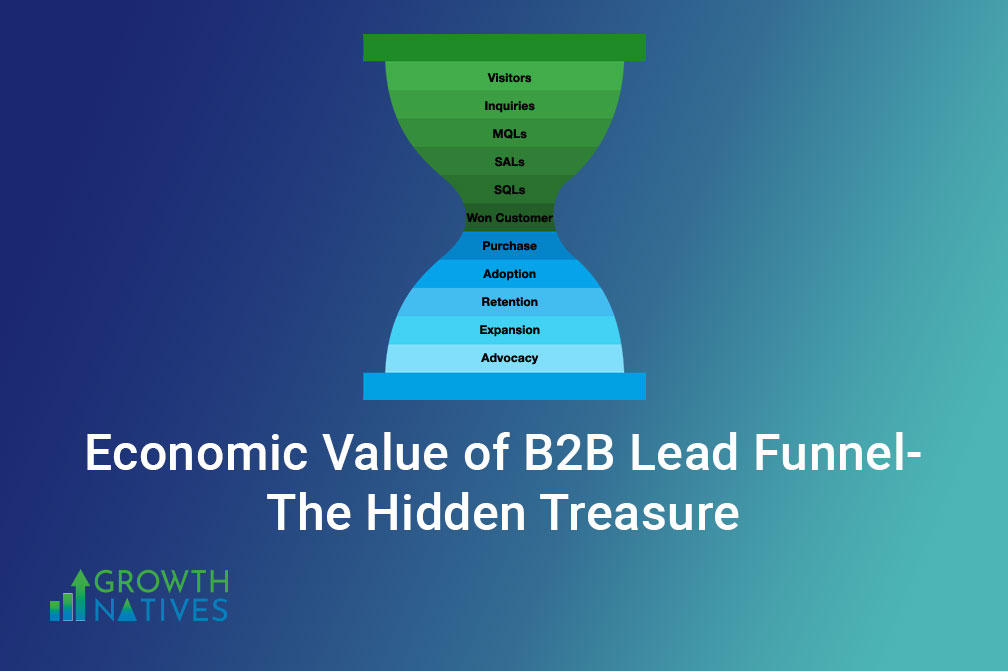Economic Value of B2B Lead Funnel- The Hidden Treasure

Table of Contents
“True wisdom is like an ocean; the deeper you go the greater the treasures you'll find.”
In 1898, when ad agency executive Elias St. Elmo Lewis developed the marketing funnel concept, he might not have imagined how it would impact the business in the future. Modern-day marketers have understood that the real growth for the organization lies in how well engagement is managed between various levels of the B2B lead funnel.
Every penny spent on bringing a customer into the funnel is important in the context of B2B marketing as every lead, which enters the funnel has an attached economical value.
Imagine a B2B lead funnel where more than 100,000 leads enter during a marketing cycle. In a lay man’s eye, these leads do not carry any value till the time they start contributing financially. But imagine if we close revenue worth $ 400,000 at the end of the marketing cycle, each of the lead will have a value of $4 at the top of the funnel. At the same time, the leads which are in the middle of the funnel also have an economic value as demonstrated in the visual below.

As leads move further down the funnel, some leads move out of the funnel without contributing. However, we can see that with each stage the value of lead increases as they move closer to conversion. Once they are converted into paid customers, these leads keep contributing till the time they keep renewing the subscription or buy more products and services.
Now, if we continue with the same example and out of 100,000 leads, we close only 40 paid customers and these customers subscribe by paying $10,000 yearly. Hence, each customer at the end of the funnel can be valued at $10,000. But if on average customers buy more or renew their commitment during the lifetime the Average Lifetime Value of the customer (CLTV) can be even higher. If the expected average CLTV is 3 times the initial purchase the same customer is worth $30,000.
We can optimize the B2B lead funnel by optimizing various metrics like Customer Acquisition Cost (CAC) and Customer Lifetime Value (CLTV). If we know our all-inclusive cost of sales and marketing that will give us the CAC and if we know the average tenure of a customer that can help determine the expected CLTV.

On the macro level, B2B organizations can scale up businesses through these metrics and seize the opportunity that lies within the entire lead funnel. They can also use these metrics in
- Creating long term vision and goals - Extrapolating results to foresee the upcoming trends- Planning budgets and deciding upon marketing spend
- Deciding upon key performance indicators
- Investing in the right marketing channels
- Focusing on the best performing Geos, Industries, Personas
- Measuring campaign successOnce you have the analytics in place about the real value of each lead in the funnel, focus on the optimization of leads at each level.
Given below are a few tips to optimize a B2B lead funnel.
1)Keep a tab over the sales and marketing data. Integrate the sales and marketing functions effectively and empower teams to collaborate with each other to achieve common goals.
2) Keep the prospects and customers engaged. They should be treated with care irrespective of they are paying customers or free leads. Today's leads are tomorrow's customers. Minimize lead leakage from the sales and marketing funnel.
3) Keep control of your lead metrics. Develop deep insight into the numbers and trends to stay ahead of the disruptions. Build predictive models to alert you about upcoming opportunities and risks.
4) Identify bottlenecks. Use CRM and marketing automation software, identify shortcomings, improve organizational and process efficiency to improve the health of your sales and marketing funnel. Setup KPIs, monitor their performance against benchmarks.
5) Focus on improving funnel velocity or average time taken from the moment a lead enters the funnel to the time deal closes. Your marketing and sales technology stack and the associated process should collaborate to speed up the closing of deals.
6) Your customers are your greatest source of learning. Building a customer-centric culture within your organization is the most important ingredient for sustainable growth. Focus on the post-sales process. Keep interacting with your paid customers. Publish their stories, make them realize that they are a part of the organizational family. Customer success is the key to B2B marketing. A happy customer will lead to a happy renewed customer and more referral customers.
Lead funnel optimization is the backbone of each B2B marketing organization. The more you optimize, the better revenue success you can expect.
Book a free 30-minute consultation with a full-funnel marketing optimization expert from Growth Natives to see possibilities you may be missing.
Author Box
Sakshi Arora
Sakshi Arora is a seasoned content writer and editor with extensive experience across various industries including B2C, B2B, travel, e-commerce, and IT. In her free time, she enjoys expressing her creative side through painting and writing poetry. She also finds solace in nature and has a deep spiritual connection. Music brings her immense joy.




